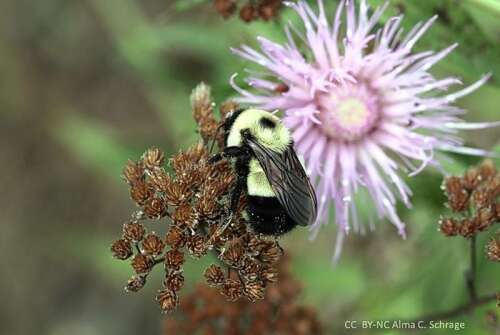A change in DuPage County’s zoning code to allow for beekeeping on smaller lots sparked concern from some who worried about the sting it would have on native bees, like the rusty patched bumblebee.
Courtesy of Alma C. Schrage
Beekeepers in unincorporated DuPage County no longer need an acre of land to house their bee colonies.
County board members voted 10-8 Tuesday to support zoning code changes to allow beekeeping on lots smaller than an acre.
Before the vote, the county only allowed beekeeping on lots greater than an acre.
The change sparked debate among board members who worried the potential increase of honeybees would adversely impact native pollinators, like the endangered rusty patched bumblebee. However, board members supporting the change noted honeybees have buzzed about for centuries.
“How long have native bees been on this earth? Forever. How long have honeybees been on this earth? Forever,” said county board member Sam Tornatore, who heads the development committee. “Why it’s become an issue in DuPage County in 2024 is beyond my comprehension.”
Earlier this month, board members delayed a vote on the proposed ordinance. Last week, they held a joint meeting of the environmental and development committees for a deeper dive into the issue.
Beekeeping will be allowed on lots smaller than one acre under new zoning rules approved by the DuPage County Board.
Courtesy of the Forest Preserve District of DuPage
Under the approved changes, beekeepers could keep up to two colonies of bees on lots smaller than an acre and up to four colonies on lots larger than an acre. The change also will bring five beekeepers, all on lots smaller than one acre and cited for violating the county’s code, into compliance, officials have said.
Before board members cast their votes Tuesday, several beekeepers spoke in favor of the ordinance saying the shrinking habitat for pollinators should be the concern, not honeybee hives.
“I agree the rusty patch is in trouble, but don’t blame other pollinators,” said Pete Soltesz, president of the Cook DuPage Beekeepers Association, one of the largest beekeeper associations in the Midwest.
“I think they made a really wise decision here today,” Soltesz said after the meeting.
Board members Liz Chaplin, Mike Childress, Sadia Covert, Dawn DeSart, Lucy Chang Evans, Paula Deacon Garcia, Mary FitzGerald Ozog and Yeena Yoo voted against the change.
“I don’t think there’s been any evidence to show that honeybees are going extinct,” said Yoo, who said she’s read various research on the topic. “But there’s been quite enough evidence and testimony and comments that this is happening to our native bees.”
Yoo and others echoed concerns expressed by the River Prairie Group of Sierra Club. The group’s chair, Connie Schmidt, Tuesday said an increase in honeybees could bring disease and force native bees out as the demand for the same food supply increases.
“Introducing additional competition and the threat of disease and parasites from additional honeybee colonies, possibly endangering our native bees, does not seem to be an environmental vote,” said Schmidt, who urged board members to further research the issue before voting.
Board members noted the approved change includes oversight by 4H, as beekeepers would need to register with 4H as a local project. They also noted that several municipalities in DuPage County allow for beekeeping on lots smaller than one acre.
